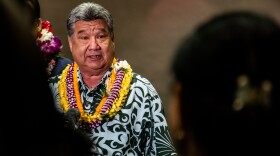Lt. Gov. Josh Green won the Democratic primary to be Hawaiʻi's next governor on Saturday after a hard-fought race against U.S. Rep. Kaiali’i Kahele and former Hawaiʻi first lady Vicky Cayetano.
Green has served as second-in-command for the past four years to Gov. David Ige, who has already served two terms and isn't eligible to run for reelection.
The winner of the Democratic primary is favored to win the Nov. 8 general election in the liberal state. Voters can expect to receive those ballots in the mail starting Oct. 21.
Former Lt. Gov. James R. “Duke” Aiona won the Republican primary for governor, defeating mixed martial arts championship fighter B.J. Penn and Honolulu City Councilmember Heidi Tsuneyoshi.
Aiona served as lieutenant governor during former Gov. Linda Lingle’s administration from 2002 to 2010. He unsuccessfully ran for governor 12 years ago.
Hawaiʻi is a vote-by-mail state so voters have been mailing their ballots and placing them in drop boxes across the islands since late July. Each island had at least one voter service for people registering to vote last minute or voting in person.
Many voters said Hawaiʻi’s high housing costs were a top issue for them. During the COVID-19 pandemic, the median price of a single-family home topped $1 million in Honolulu, Maui and Kauaʻi counties.
To address the housing shortage, Green said he would issue an executive order to eliminate red tape and streamline construction approvals and enforce existing laws to shut down illegal vacation rentals.
Aiona said he would eliminate the state Land Use Commission, which he blamed for slowing housing development.
Green was a state senator and representative before serving as lieutenant governor. He was a doctor in rural areas on the Big Island before entering politics. He has continued working part time as a physician while in the state Legislature and as lieutenant governor.
Green developed a following during the COVID-19 pandemic for his explanations of infection rates and trends and hospital treatment capacity.
The state’s largest unions endorsed his candidacy in the primary, including the Hawaiʻi Government Employees Association and the Hawaiʻi State Teachers Association.
The race got heated when Kahele and Cayetano questioned income that Green received while lieutenant governor from a limited liability company called Green Health International LLC. Green, who has continued in his emergency room doctor side job while lieutenant governor, said the money was for work he performed as a physician.
Kahele drew attention this year for his own side job as a Hawaiian Airlines pilot and his heavy use of proxy voting in Congress. Like everyone who has voted by proxy, he submitted a required letter attesting he was “unable to physically” vote at the Capitol. He cited “the ongoing public health emergency.”
Green was born in Kingston, New York, and grew up in Pittsburgh. He moved to Hawaiʻi with the National Health Service Corps in 2000.
Kahele’s decision to run for governor opened up his congressional seat representing the neighbor islands and non-urban Oʻahu. Kahele told HPR that he would not run for office again if he lost the primary election.
Former state Sen. Jill Tokuda beat state Rep. Patrick Pihana Branco for the Democratic nomination for that seat, Hawaiʻi's 2nd Congressional District.
Among Republicans, former U.S. Air Force intelligence analyst and businessman Joe Akana defeated business owner Joseph Webster.
In the 1st Congressional District, incumbent U.S. Rep. Ed Case beat attorney and political newcomer Sergio Alcubilla in the Democratic primary. Case in the general election will face former U.S. Navy SEAL Conrad Kress, who defeated two other candidates to win the Republican primary.
In the U.S. Senate race, sitting U.S. Sen. Brian Schatz defeated Democratic primary challenger Steve Tataii, a conflict resolution consultant. Tataii made an unsuccessful bid for Congress in 2016.
In the Republican primary for U.S. Senate, state Rep. Bob McDermott beat five other candidates.
———
Voter resources and important links:
- Register to vote or check if you are registered. You can also call 808-453-VOTE or toll-free 800-442-VOTE from the neighbor islands.
- Kauaʻi County Elections Division
- City and County of Honolulu Elections Division
- Maui County Elections Division
- Hawaiʻi County Elections Division
The Associated Press reporter Audrey McAvoy contributed to this report.









